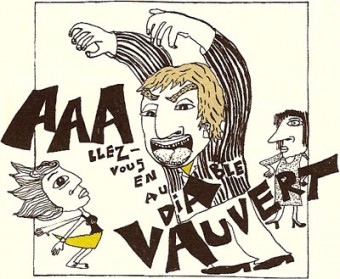
L’ Eléphant
For some reason, Isabelle Pralong’s name lingered with me. Yet, the last time I had heard of her, it was back in 1999 when she had released her Ficus at Atrabile, a short slice-of-life organized around the plant of the title. Since, nothing in the comic field, she had moved to illustration works and children’s books (with Fourmi ? in 2004). Hence my surprise when I discovered this Elephant in the shelves, as impressive as it was unexpected.
“- I’m calling from the hospital it’s about your father he
– I don’t have a father.
– Everybody has one, missus, and yours is here. In a coma.”
If Isabelle Pralong’s introduction to this book[1] sounds like a coup de théâtre, this is the only spectacular device she will resort to in a story that is built around little touches, a subtle narration relying on echoes, where everything has its importance and nothing is left to chance.
Claire is 39 and has two kids — as mother, she is an adult both by age and role. But this news of a father barging in into her life suddenly position here back as a child. How to win back your father ? How to make yours the father figure when you have never met him ? How to, on a more basic level, even establish dialogue with this inert and silent body, that you don’t know nor understand ? Claire tries to put on this new role that befell her, this daughter role — but while as a costume designer, she helps actors turn into the characters they play, while she works on perfecting make-believes, she can not/will not.
She should talk to him. But talking is difficult.[2] Difficult to meet people, even harder to make a movement, or initiate a contact.[3]
Surrounding this inner turmoil, the storm of life rages on, and she has to face it and endure. Hiding what is happening inside,[4] so as to limit what could escape in the open. Here I have to mention Isabelle Pralong’s art, with a fragile and expressive line, that makes the spaces around Claire resonnate — the outside directly reacting to the emotions inside. Rooms become huge and elevators oppressing, speech balloons soar like gusts of wind, characters grow or shrink with the strength of their anger …
Luckily, there are encounters. Encounters with others, who dare reach out or talk — accidental encounters in mnay ways, but which bring back confidence, which allow finding back some footing in this storm of emotions and memories that come back to the surface. In this universe from which men are absent, she sets on a quest to win back the one man who should have been, at least for a time, “the Man”,[5] even if she has to cling to what is left — the eyes (to cry with ?). But Claire makes progress, little by little opens to others, manages to talk. And as she finally accepts the idea of this filiation, she receives proofs of paternity — like gifts.[6]
And if you needed but one reason to remember Isabelle Pralong’s name — this Elephant, subtle and intimate, should be more than enough.
Notes
- Which numbers close to 80 pages, a healthy portion of her refined art.
- Of course, this is illustrated by the way the relation between Claire and Nina started off, but in my opinion their current mode of communication is even more symbolic of this : a communication that exausts or avoids words, and functions with grand movements and monosyllabs : “Where ? Here. Here ? No, here, here and there. What is is ?”.
- Twice at the beginning of the book, Claire expresses the desire for human touch, with the generously-endowed actress and with the mother met at the school entrance. A desire certainly increased by the absence of her Dimitri, whom she talks to on the phone (but without being able to reach him every time), and who leaves her sleeping alone.
- Be it her own anxieties or “foul breath worthy of a desert jackal”.
- Thie represents a further confusion of the adult life, where the Oedipus or Electre complex has long been overcome. Here, the situation is nearly an inverted Electre — the mother declining the rival position, and the daughter reluctant to go and seduce her father …
- And this is the time that her man, Dimitri, chooses to come back. As if this journey of winning back her father could only happen in this parenthesis, the presence-existence of the significant other giving weight to the adult-woman state in opposition to the child-girl state.
 l’autre bande dessinée
l’autre bande dessinée




